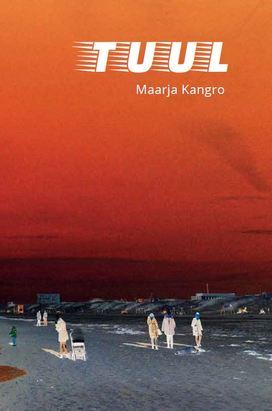Nähtamatu Ahv 2019, 120 pp.
ISBN 9789949013357
Maarja Kangro holds an unshakeable position on the Estonian literary scene. Her poetry, prose, and translations always spark lively debate, garnering admiration and scorn alike. The storm that rose around her autobiographical works The Glass Child and My Awards hasn’t yet blown over, and not without cause. Kangro is strikingly frank and her cultural reach is expansive; one could even call it elite. The storms have been followed by Wind, which several Estonian literary critics have called her best collection of poetry yet.
Wind is a blend of autobiographical experiences that collide with broader societal developments and, as always, the constant polarity-crossing dance of Eros and Thanatos. There is also a temporal dimension: a teenage girl who says in 1991, “I’d rather read sartre kafka dürrenmatt / but it’s like I’ve got to score / life has to be awful / and I can’t even imagine it doesn’t” (p. 15) encounters scummy Estonian bastards in 1998: “the Estonian guys at the other table / have cropped hair / their bear-like brows low of course / equador they scream / equador you should be ashamed / estonian girls can’t find themselves / a real man they / whore themselves out to macaroni” (p. 22), and transitions into a settled social setting in 2015 where there is “a birthday party / in a terraced house / with salmon champignons and pavlova / conversation includes new brake discs / cultural policy” (p. 47).
Like Kangro’s earlier works, Wind has been criticized for its excessive intellectualism and unnecessary layers of meaning and references. At the same time, these aspects do not disturb or impede the poems’ interpretation. Rather, it might cause a certain sense of embarrassment to surface when you see someone navigating different languages and cultural dimensions so effortlessly – not posturing, but simply staying true to the author’s nature. Equivocal references clash with unequivocal ones (o rose thou art sic); linguistic finesse encounters a crudeness that is not grating, but rather a natural fit with the work as a whole.
There is also rhyming verse, which the author claims is once again in vogue. And it functions well in Estonian: “why is there no door in the doorway / through which you hear: for me, a Caesar salad / how can we know our avant-garde is valid / the poet leaps her face says make way” (p. 112).
Kangro points out and critiques societal changes: “Old Town reeks of / cheap deep-fry / ochlocracy / the tourists are ripe for something / the kulturtante is ripe / the little nazis are ripe / I stare at ripe rotten apples / framed by the night sky / dark fermenting apples / the sea is black” (p. 44). Or: “the tots are running things today! the tots who were afraid their tot-world / would be taken away / are finally getting / their way and choosing the cartoons” (p. 101). I can firmly state that Kangro is one of the keenest social-critical poets of our day and a perceptive observer of life in general, because it is an art to take all the excrement coursing through the sewers, the bums cast out on their butts, and the orgasms that never came, and then put them into context. Life’s trivialities embrace meaningful moments. Wind’s poems are outspoken, piercing, and precise: men are meat, words are an element of the bloodstream, body and soul are interwoven, and they needn’t be set apart. Wind deserves repeat-reading and certainly will not lose its bite over time. Thank you, Maarja Kangro!
Siim Lill is an autonomous expert.

